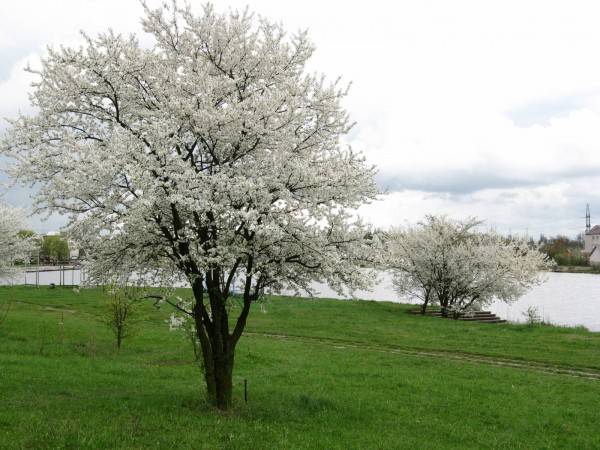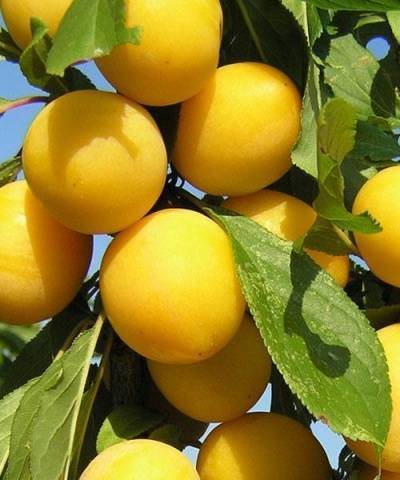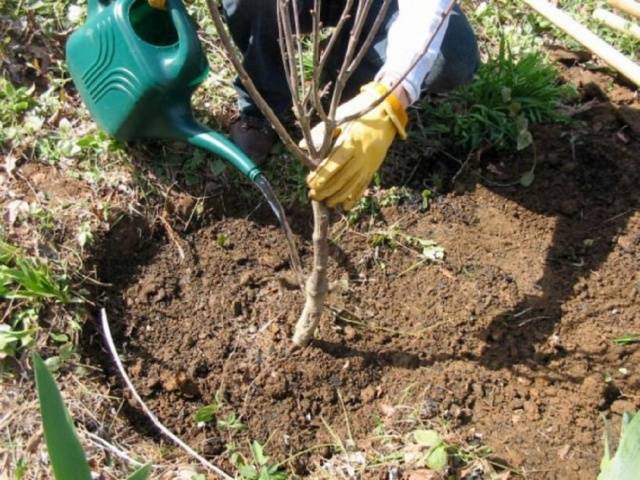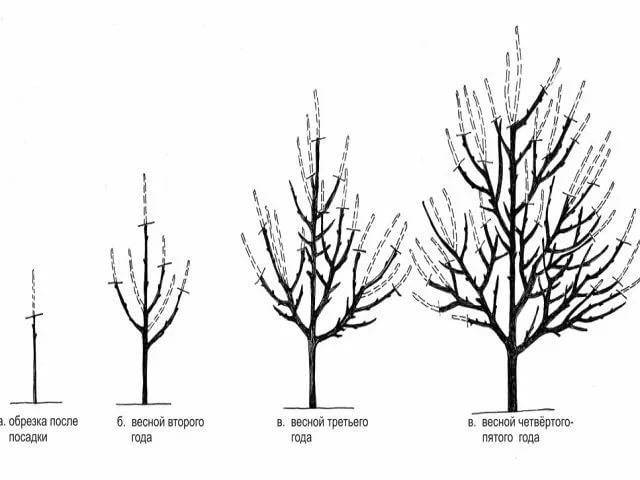Content
Cherry plum is one of the most popular varieties of large-fruited plum, characterized by late ripening. The culture grows in the regions of the middle zone, tolerates low temperatures favorably and is quite resistant to various diseases of fungal or viral origin.
Breeding history
The Mara variety was bred in the late 80s of the XX century by cross-pollination of the garden cherry plums and Chinese plum by scientists from Belarus. The main work was carried out by such breeders as Matveeva V.A., Maksimenko M.G. and others. The variety was introduced into the State Register of the Russian Federation in 2002.
Description of culture
This variety of plum is characterized by a fairly large size. The height of the cherry plum tree Mara by the 4th-5th year of life can reach 3-3.5 meters. The crown is spreading, most often spherical, about 2.5-2.7 meters in diameter. The tree grows especially fast in the first years after planting.
For clarity, below is a photo of the cherry plum Mara. As you can see, the bark of the cherry plum is dark brown, on young shoots it has a slightly reddish tint. The root system is well developed. Leaves are oval, slightly elongated and deep green. Flowers are white, numerous.
The description of the Russian plum (cherry plum Mara) also includes the characteristics of the fruit. Fruits are bright yellow, round, large and fleshy, the weight of one plum is about 25 g. The stone is poorly separated from the pulp.
Plum Mara can be grown both in the southern regions and in the regions of central Russia.
Characteristics
A distinctive feature of this crop from other varieties of plum, most often grown in the south, is its high frost resistance and resistance to pests and diseases. That is why cherry plum Mara in the suburbs and other central regions feels great.
Drought resistance, winter hardiness
The main characteristic of the Maara cherry plum variety is winter hardiness. The culture can tolerate temperatures down to -35-37 ° C.
Drought tolerance is average. In long periods without precipitation, the plant needs to be properly watered.
Pollination, flowering period and ripening times
The plum variety is self-fertile, therefore pollinators for the Mara cherry plum are needed to get the harvest. First of all, these are other plum varieties that have similar flowering times, for example, Vitba.
Flowering occurs quite late - in late April or early May. The ripening period of fruits falls on the third decade of August or even at the beginning of September. These terms depend on the region of cultivation and the characteristics of climatic conditions.
Productivity, fruiting
The high yield of cherry plum Mara is one of the main advantages of the variety. Starting from the third year after planting, about 37-40 kg of juicy and ripe fruits can be harvested from each adult tree. The maximum fruiting begins from about the 7th year of life, then the yield can reach more than 60 kg.
Scope of the fruit
The fruits of this plum variety have excellent taste, and reviews of Mara cherry plum are the main confirmation of this fact.According to the tasting score, the fruits receive 4.2 points out of the maximum 5. Pleasant aroma and sweet-sour taste allow using plums for preparing compotes, various sauces, as well as for making preparations for the winter.
Disease and pest resistance
Resistance to fungal or viral diseases, as well as pests in the Mara variety is quite high. Regular preventive measures allow avoiding any contamination of the crop for a long time.
Advantages and disadvantages
The main strengths of Mara are:
- high productivity;
- large-fruited;
- winter hardiness and drought resistance;
- immunity to many diseases and resistance to pests;
- excellent taste of the fruit.
Weaknesses of culture are:
- self-infertility;
- late flowering and fruiting.
Despite these minor drawbacks, the Mara plum is still considered one of the best crops suitable for growing in regions with a cold and unstable climate.
Landing features
The cultivation of Mara cherry plum has a number of its own characteristics, the observance of which is necessary to obtain a rich harvest and ensure the successful growth of the plant.
Recommended timing
Plums are usually planted in the spring. It is during this period that the risks of freezing of the root system or damage to shoots are minimized.
Choosing the right place
Cherry plum is a light-loving crop, so for planting it is best to choose the southern or southwestern side of the site with some kind of structure or fence from the northern winds. Groundwater should be located at a distance of about 2 meters from the surface of the earth. The variety prefers rather loose, neutral or slightly acidified soils.
What crops can and cannot be planted next to cherry plum
Yellow cherry plum Mara feels good next to apricot, other varieties of plum or cherry. It is not recommended to plant a crop next to tomatoes, eggplants, as well as trees and shrubs with a powerful root system.
Selection and preparation of planting material
It is best to purchase seedlings about two years old, since they are the ones that take root without much effort. When choosing a planting material, it is important to pay attention to the following parameters:
- the integrity of the root system;
- the external condition of the shoots and trunk;
- no signs of the disease.
It is recommended to purchase seedlings of any plants, including cherry plum, only in proven nurseries, where real professionals are engaged in growing crops.
Landing algorithm
The main stages of planting cherry plum:
- Preparing a pit with a depth and diameter of about 75-80 cm. The topsoil is mixed with black earth, peat and sand in equal amounts. You can also add about 2 kg of ash.
- A layer of crushed stone or expanded clay 10 cm thick is laid at the bottom of the pit.
- The pit is covered by 2/3 of the prepared substrate, a seedling is installed on top. The root system is covered with the rest of the earth, while the root collar should be flush with the soil.
- The seedling is tied to a peg, and a near-trunk circle is formed around the entire perimeter of the pit.
- Finally, the soil needs to be shed with 10-15 liters of water and loosened in a day.
Follow-up care of the culture
Undoubtedly, Russian plum (cherry plum Mara) belongs to varieties with high yields. But for this it is important to follow the basic rules of crop care.
You need to water the plum about 1-2 times a month, 10-15 liters of water at a time. The watering regime depends on the climate, but it is important to remember that the variety categorically does not like stagnant water. After each watering, it is necessary to loosen and mulch the soil.
Fertilization for cherry plum is carried out every year according to the following scheme:
- in the spring - fertilizers containing nitrogen;
- at the end of May - potash fertilizers;
- in the autumn - preparations containing phosphorus.
Pruning and crown formation is carried out in the spring, until the buds appear. In this case, all branches are cut off, except for strong, strong and young shoots.
This variety does not require any preparation for winter, but if desired, the trunk and shoots can be covered with a net to protect against rodents.
Diseases and pests, methods of control and prevention
The cherry plum variety Mara is very rarely exposed to any diseases or pest attacks. But in the absence of proper crop care, the following diseases may occur.
Disease | Methods of control and prevention |
Red leaf spot | At the beginning of the growing season, for prevention, it is necessary to spray with fungicides. |
Gum therapy | Cleaning of wounds and subsequent treatment with a solution of copper sulfate (1%) |
Milky shine | Cutting and burning shoots with leaves that have acquired an uncharacteristic silvery sheen |
Pest type | Methods of control and prevention |
Moth | As a preventive measure, trees can be treated with "Fufanon" or "Iskra" |
Plum sawfly | Regular insecticide treatment |
Conclusion
Cherry plum Mara is a large-fruited, winter-hardy variety with high yield rates and excellent fruit taste. It is thanks to these advantages that the variety has become so widespread and is grown not only in the south, but also in the central regions.












